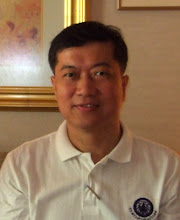สำนวน Hobson's choice มีที่มาจากเจ้าของโรงเช่าม้าในอังกฤษยุคศตวรรษที่ 16 ชื่อ Thomas Hobson
เวลามีนักศึกษามหาวิทยาลัยเคมบริดจ์ (ซึ่งอยู่ใกล้) มาขอเช่าม้าของเขา เขาก็จะบอกว่ามีสองทางเลือก คือเอาตัวที่ใกล้ประตูโรงเช่าม้าที่สุด หรือไม่ก็ไม่ต้องเอาเลย
Hobson's choice จึงกลายมาเป็นสำนวนที่แปลว่า ทางเลือกที่จริงๆ แล้วไม่ได้เป็นทางเลือกเลย
และสำนวนนี้ก็ได้ถูกนำมาใช้เป็นพาดหัวบทความในหนังสือพิมพ์ Wall Street Journal Asia เกี่ยวกับการลงประชามติ "เลือก" รัฐธรรมนูญของไทย
Hobson's Choice in Thailand
Wall Street Journal Asia, August 16, 2007
Editorial and Opinion
Thais head to the polls on Sunday to vote on a new constitution conjured up by the military-backed government. If voters reject the document, the junta says it will impose its own constitution on the country. This is a Hobson's Choice: a "free" choice that isn't a choice at all.
The military is promoting Sunday's referendum as a signal of its genuine desire to restore democracy -- a clean break, as it were, from the corruption-fueled days of former Prime Minister Thaksin Shinawatra, whose popularly elected government was overturned by a non-violent coup last September. The proposed constitution is clearly a reaction to Mr. Thaksin's heavy-handed, often unchecked, style of governance.
The new constitution would considerably weaken the institutions of the prime minister's power, namely the executive and the legislature. It would do this most notably by making it easier for the legislature to impeach the prime minister and by using a seven-member panel to appoint 74 of the senate's 150 seats -- ensuring Bangkok's elites have a stronger say in policy.
The constitution also proposes to consolidate voting constituencies in such a way as to encourage smaller parties -- and less powerful political coalitions. The aim is to discourage the formation of big, populist political umbrellas along the lines of Mr. Thaksin's rural-based Thak Rai Thai. There's plenty of room for corruption here; the seven-member panel that appoints the senators -- who, along with their colleagues, can impeach the executive -- will operate effectively unchecked.
"Going to vote is a way of exercising your rights," Prime Minister Surayud Chulanont said a televised speech this week. "It is a way of expressing your devotion to democracy and repaying the nation. It is a way to help decide the country's future by exercising your judgment."
Those are nice sentiments, but the reality is that the new constitution would benefit the generals, who, as in previous decades, will lurk in the background, even if the new constitution passes. The generals have already written their own amnesty into law, and the legislature is mulling an Internal Security Act that reportedly would give the military wide, unchecked powers. Not to mention the generous bonuses and the 24% defense budget hike that the generals gave themselves this year -- at the expense of other priorities such as health care and education.
There never was any pretense that the public would have a strong say in the contents of the proposed constitution, which was drafted by a junta-appointed committee. Yet there was some deference to public opinion. The junta originally proposed a wholly appointed senate and a National Crisis Council that would have given the military the power to crack down when it deemed it necessary. After public protests, those provisions were removed.
The crawldowns imply the generals want to avoid a rerun of 1992, when a coup leader appointed himself prime minister and triggered huge street protests. Some 50 people died in the military crackdown that followed, and scores more were injured or simply disappeared. The generals found themselves soon replaced by pro-democracy parties with overwhelming public support. Today's junta is trying to play it smarter, keeping the facade of democratic change while entrenching its own power.
It remains to be seen how the new constitution, if passed, will impact Thailand's future. If anything, it seems to bode a return to the revolving-door politics of the 1980s, when small parties dominated and the executive was weak. This is better than the current political limbo, where a military-backed government governs without a popular mandate. But it's not ideal, by any means, for a Thai public that has wanted real democracy for decades.
The generals need only a simple majority of the voters who turn up to claim victory. It's unlikely that the referendum will fail. But if turnout is low, or if the constitution passes by a small margin, Thais may decide to express their political views the only way they can -- by taking to the streets.
skip to main |
skip to sidebar

ถ้าคุณเคยอ่านคอลัมน์ "ฟอไฟฟุดฟิดอังกฤษอเมริกัน" ในหนังสือพิมพ์เดลินิวส์แล้วยังไม่เข็ด ก็เชิญอ่านบลอกนี้ได้ครับ แต่อย่าหาว่าเราไม่เตือนแล้วกัน
Followers
Kindle 2 is here, at last!
สำหรับแฟนฟอไฟฟุดฟิดอังกฤษอเมริกัน
My Other Stuff on the Web = อย่างอื่นของผมในเว็บ
Blog Archive = บลอกตอนเก่าๆ
About Me = เกี่ยวกับตัวผม

- Bob Boonhod
- I began writing my column in 1989. The column became the basis for 6 books and one audio CD. ผมเริ่มเขียนคอลัมน์นี้เมื่อปี 2532 และได้รวมเล่มเป็นหนังสือ 6 เล่ม และซีดี 1 ชุด For details, see: ดูรายละเอียดได้ที่ http://boonhod.50megs.com/MyBooks.html
My Cool Friends
Cool Links
- Bangkok Pundit
- OEDB Writing Resources: ตำราสารพัดสำหรับนักเขียน
- Dumb Little Man: พัฒนาตัวเองได้ที่นี่
- Truemors ข่าวสดๆ น่าสนใจ
- Electronic Frontier Foundation มูลนิธิเพื่ออินเตอร์เน็ตเสรี
- FACT: เพื่อเสรีภาพทางความคิดของคนไทย
- An Inconvenient Truth: ภัยโลกร้อน
- Brad DeLong อาจารย์เศรษฐศาสตร์ที่ UC Berkeley
- Dani Rodrik's blog
- วารสาร Harvard International Review
- นิตยสาร Wired
- นิตยสาร Technology Review
- Thai E-News
- นิตยสาร Open Online
- นิตยสารสยามปริทัศน์
- สำนักพิมพ์ฟ้าเดียวกัน
- Illustrator World: ศูนย์รวมเซียน Illustrator
- Worth 1000: ศูนย์รวมเซียน Photoshop
- มหาวิทยาลัยที่สอนให้ผมรักประชาชน
- UCLA มหาวิทยาลัยที่ผมเรียน
- USC มหาวิทยาลัยที่ผมเรียน
- American Mensa สมาคมที่ผมเคยเป็นสมาชิก

No comments:
Post a Comment